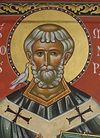

| Previous day | Next day |
| Old Style
March 12
|
Friday |
New Style
March 25
|
|
3rd Week of Great Lent.
Tone 6.
Great Lent. |
Monastic rule: xerophagy (bread, uncooked fruits and vegetables).
|
![]() St. Theophanes the Confessor, of Sigriane (818).
St. Theophanes the Confessor, of Sigriane (818).
Righteous Phineas, grandson of Aaron (ca. 1500 b.c.). St. Gregory the Dialogist, pope of Rome (604). Sts. Symeon the New Theologian (1021), and his elder, Symeon the Reverent, of the Studion (987).
New Hieromartyr Vladimir (Volkov), archimandrite, of Islavskoe (Moscow) (1938).
Icon of the Most Holy Theotokos “Not-Made-by-Hands” (on the Pillar) at Lydda (1st c.).
Righteous Aaron the High Priest, brother of Prophet Moses the God-seer (ca. 1530 b.c.). St. Cyrus, monk, of Alexandria (6th c.). St. Paul Aurelian, bishop of Leon in Brittany (572). St. Alphege, bishop of Winchester, England (951). St. Nicodemus of Mammola in Calabria (990). Martyr Demetrius the Devoted, king of Georgia (1289). St. Dragutin (monk Theoctistus) of Serbia (1316).
Repose of Schemamonk Anthony the Gorge-dweller, of Zelenchug Monastery in Kuban (1908).
Thoughts for Each Day of the Year
According to the Daily Church Readings from the Word of God
By St. Theophan the Recluse

Friday.
The wicked shall fall by his own wickedness (Prov. 11: 5).[1] Impiety is an incorrect relationship to God, or complete forgetfulness of God, to which belong also unbelief in the existence of God and in His providence for creatures. Some souls, being oppressed by wicked thoughts like these, but desiring nevertheless to be respectable individuals, resolve, “I will be upright, honest, and humane, not occupying myself with whether there is something higher than me which observes me, has expectations of me, and is able to demand an account.” And what is the result? The blessing of God—which they do not seek—does not abide with them, and their affairs do not prosper. Their conscience daily reminds them about their deeds either of unrighteousness, dishonesty or inhumanity. They only make a show of righteousness before other people in order to justify themselves, sharply fending off accusation, and falsely interpreting facts as needed. He whose conscious is inwardly blameless has no need of self-justification. Those who are not attentive to themselves allow this inner discord to slip by: those who are attentive control this with difficulty. Oh, when will one of such people conscientiously look at this discord, and discern where it comes from and how to set it right? He could then both set himself right and direct others toward the proper harmony.
[1] The Slavonic for Prov. 11:5 reads: The impious shall fall by his own impiety.









